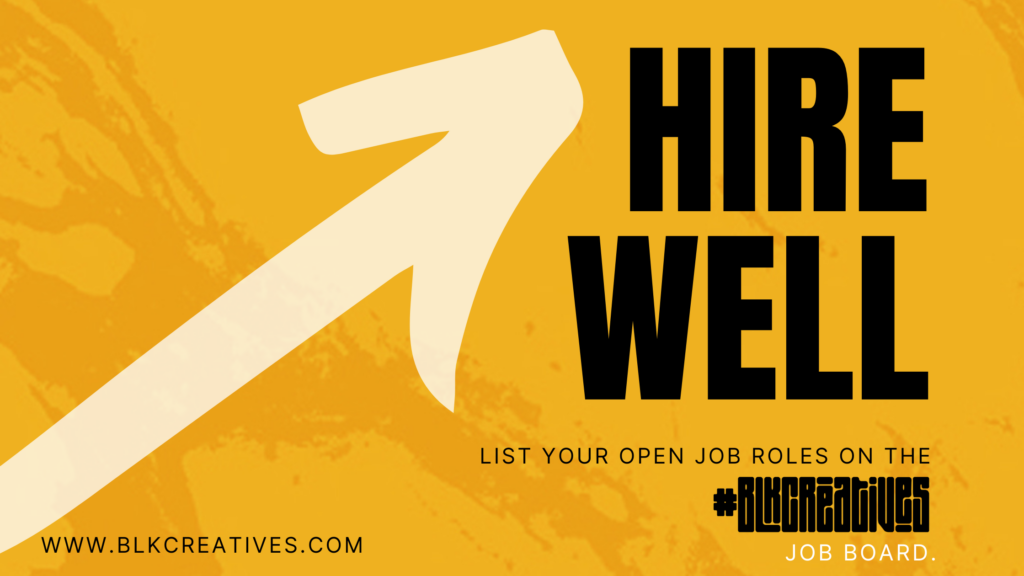Black employees and their needs, specifically as it relates to Black and creative millennial professionals, are evolving. Even after we’ve spent a year living in and through a pandemic and through one of the most politically charged summers we’ve seen, the discussion around diversity and inclusion still isn’t taking into account the humanity of Black people, especially at work.
There’s always conversation around what employers are looking for but no one ever asks what employees are looking for.
Our platform is an advocate for Black creative professionals across various industries. This means that we’ll always be thinking about the Black creative/employee, first. And here’s what some of them in our community had to share about what companies and employers miss when it comes to their needs.
Black Millennials support all types of family dynamics – security and stability are priorities.
As she was entering an important stage in her life and searching for new opportunities, Ariana Walton had stability at the top of her mind, not just because of herself but because of her growing family. “Security in salary and the actual work,” she shares. Ariana is the Founder of Black Woman-Owned and Community Manager at We Are Rosie. “I was so happy to be in my first official marketing job and get back to work after being laid off on maternity leave and being away for so long.”
Not only are we parents but we’re also caregivers and supporting our families in various ways. Employment doesn’t always have just a singular impact, it shapes communities.
Our mental health is a top priority.
White supremacy is a problem that America needs to address head-on. Black people are prone to an unbelievable amount of stress, exhaustion, and anger because of America’s problem of White supremacy. Not just for ourselves but for other people of color, seen most recently seen in the recent tragic Atlanta massacre.
These things weigh heavily on our emotional and mental health, and we need space to heal and to nurture ourselves and each other.
“Black employees need time to regroup with each other and validate their experiences to make sure they aren’t crazy,” urges Michael Tonge, Cultural Strategist and Founder of The Culture LP. “Being alone in large groups and having to navigate microaggressions and implicit bias on their own is exhausting.”
“Black employees need time to regroup with each other and validate their experiences to make sure they aren’t crazy." – @mikey718_ for #blkcreatives Share on XAccording to this 2020 Gallup article, young Black adults, aged 18 to 39, are three times as likely as older Black adults, aged 56 and older, to report having been treated with disrespect. Written by Camille Lloyd, Director at the Gallup Center on Black Voices, the article also noted that across all microaggressions Gallup measured, Black Americans were much more likely than White, Hispanic and Asian Americans to report having these experiences.
The next time your Black employee needs a day off, an explanation shouldn’t have to be given, let alone required.
“Black employees need PTO/mental health days more than anyone else,” expresses Ariel Lopez CEO of Knac.

Professional growth + development > a “culture fit
“Companies and employers are missing out on giving Black employees real opportunities for learning and development,” Ariel continues. Her company Knac uses data to remove bias in the application process while improving the candidate experience, helping recruiters automatically screen 100% of resumes.
“There’s no reason there should be this massive gap in management and senior roles if companies actually did what they were supposed to do.”
“There’s no reason there should be this massive gap in management and senior roles if companies actually did what they were supposed to do.” – @arielLopez__ for #blkcreatives Share on XIn our community, the next opportunity is a bridge to a bigger, healthier vision for their lives. That means the bridge will lead us to learn about our skills, our approach to work, and how we want to show up in our work.
“I think a lot of companies are too focused on hiring for ‘culture fit’ — for many of us, this can ring a bit of an alarm bell because quite frankly we’re usually one of only a few within that company culture (or would be one of a few, if in the interview process),” reveals affiliate partnership manager, Rob Bates. “Naturally this promotes likeness, and can further embolden doing things the way they’ve always been done.”
"I think a lot of companies are too focused on hiring for ‘culture fit’ — for many of us, this can ring a bit of an alarm bell." – @robbates for #blkcreatives Share on XNothing screams this won’t work out well louder than being forced to be like someone else. We want to be our best selves.
Bottom line, Black creatives are intentionally searching for job and client opportunities that align with the fulfilled lives we see for ourselves – jobs are an important part of that vision. And as Michael reminds us, that vision also includes “reparations/pay equity.”
Our job board is a chance to meet Black creatives where they are in their search for fulfilling, sustainable employment. Companies can submit their open roles here.
About the Author
Melissa Kimble
Melissa Kimble is the Founder of #blkcreatives with two hometowns: Chicago and Memphis. Hov fan. Snowfall scholar. Catfish frier. Still thinks The Coldest Winter Ever should be made into a movie.
